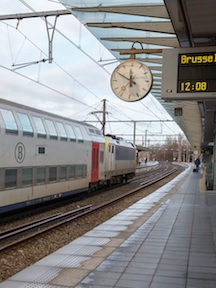By Hania Mariën
At 8:05, on Tuesday morning, March 2, I wake up in Hasselt, Belgium. I grab a quick breakfast, pack a lunch, and run down the stairs of my residence—I have to catch the train to class, which leaves at 8:32. Trains here almost always leave on time. I sprint to the train station, snatch a Metro newspaper, and locate the correct railway. 8:30. The conductor blows his whistle, does his last check for chronically late passengers, sees one (me), and then shuts the doors. I’m just in time. It’s 8:32.
It’s just like every day: Adults commuting to work, students to school. Everyone is reading the Metro. I look at my copy. “One out of five Belgians doesn’t want [their] child to find a partner of another skin color,” I read. The headline of the newspaper on the seat next to me is about the previous week’s capture of Salah Abdeslam by Belgian police.
At 8:44 my phone vibrates. A family member asks me if I’m okay. He tells me of terrorist attacks in Brussels. The rest of the morning I catch bits and pieces of conversations. Bommen. Brussel. Zaventem. De metro. Slachtoffers. Gewonden. IS. Bommenpakket.
By the time I reach the Leuven station at 9:25, I’ve learned a lot, but only by word of mouth. I know there were three bomb attacks in Brussels. I know public transportation to, and within, Brussels is a mess. On the bus, radio transmissions tell us to stay off the streets and to turn around if we are headed in the direction of Brussels. People listen. They don’t talk.
When I get to class at 10:00, my professor is surprised to see me—“I didn’t think you’d get here,” she says. “I heard public transportation is shut down.” Many professors are pretty shaken. Several had children and/or students on the metro behind the car that exploded. She asks us if we’ve heard about what happened. We all nod in confirmation.
But what does this confirmation mean—that we’ve “heard about what happened?” I’ve “heard” via text what some Belgian and American news networks are saying. I’ve heard the radio announcements on the bus and overheard pieces of conversations. I’ve heard my professors’ stories. What have my fellow students “heard”? And how has what we’ve “heard” been influenced by our life experiences, including 9/11?
Last year, in a Willamette University course, Creating Stories for Social Change, we watched Chimamanda Adichie’s Ted Talk The Danger of a Single Story. In her presentation, Adichie explains: stories are shaped by many factors, including how, when and by whom they are told; single stories are created by showing a people as “one thing over and over again, and that is what they become”; that such stories create stereotypes; and that “the problem with stereotypes is not that they are untrue, but that they are incomplete. They make one story become the only story.”
As any overly-analytical liberal arts student might do, I began to wonder: what single stories was I internalizing about the day’s events? What stereotypes were these stories perpetuating? How might these stereotypes impact and strengthen growing anti-immigration sentiments and affect the un-waning refugee stream in Belgium?
I wanted answers. That night, I delved into the news. I read headlines about Brussels and the American and Belgian victims. I read about the Utah missionary who survived the attacks. I read about the underlying story I heard in class and on the train: a single story of white Christians being victimized by the “other.”
As I continued my investigation, I made an unsettling discovery about the March terrorist attacks in Turkey, and a January attack in Nigeria. Why hadn’t these stories made international headlines? Why, as a liberal arts student who often speaks of the importance of bringing a diversity of voices to the table, was I just now reading these stories?
That was when I recognized how quickly I bought into a single, Western media story of March 22 that devalued non-white, non-Christian lives. I was ashamed that my own acute awareness of and reaction to terrorism had mounted only with the headlines, and proximity, of the attacks in Brussels, Belgium. And yet, I found a strange comfort in the recognition of my mistake—of buying into that single story—knowing that I was compelled, by Adichie and my studies at Willamette University, to demand more than a single story of March 22, 2016.
Hania Mariën is a junior at Willamette University majoring in anthropology and Spanish. Willamette University is home to the Delta of Oregon Chapter of Phi Beta Kappa.




